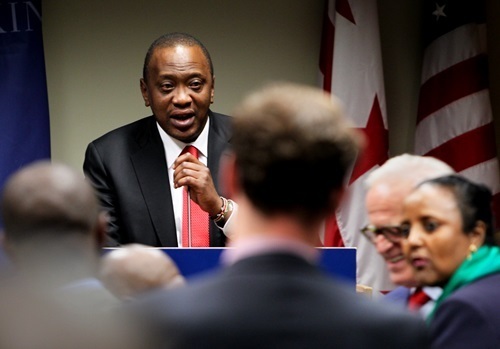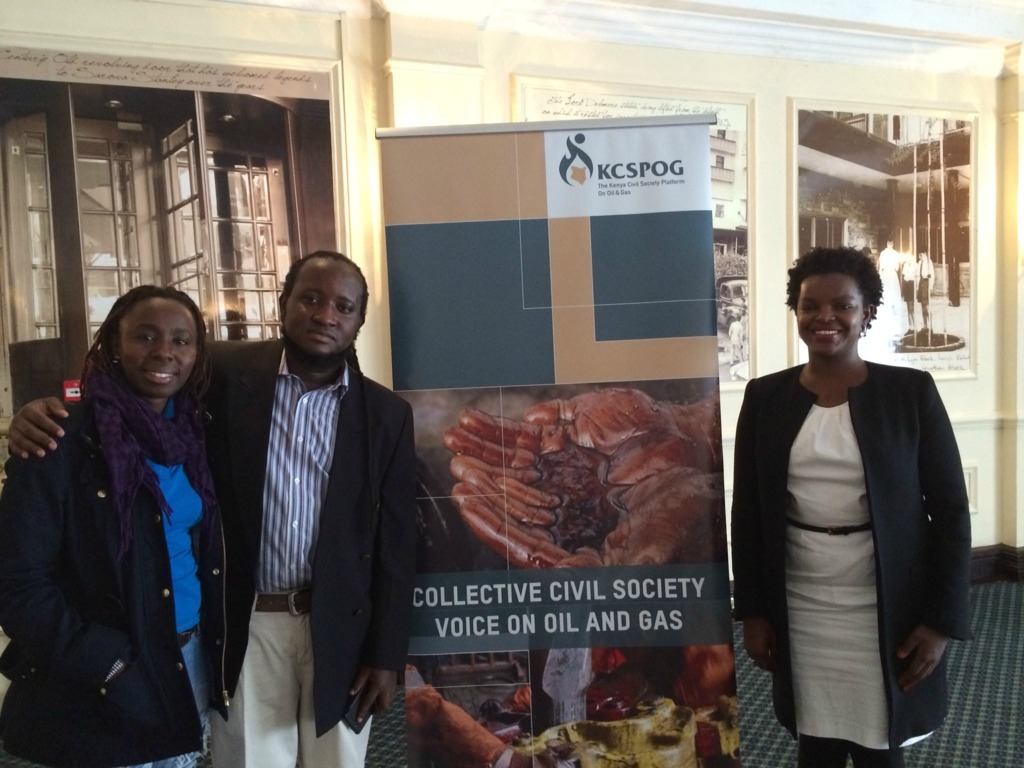“Absolutely” – Kenya President backs full oil contract disclosure
President Kenyatta supports key demand of civil society on extractives contracts
There was one lasting highlight for me from this month’s US-Africa Leaders Summit in Washington. But it wasn’t during the billion dollar deals between US corporations and African nations, nor in celebrity-attended state dinners.

In a small group discussion at the Brookings Institution on August 7th, “Kenya’s Domestic, Regional and International Priorities: A Conversation with President Uhuru Muigai Kenyatta,” I was able to ask President Kenyatta whether his government would back full disclosure of petroleum agreements in his country.
Before the round of questions was over Pres. Kenyatta jumped in to answer my question, “Absolutely!”
The country is experiencing an oil boom with a significant discovery by Tullow Oil in remote Turkana County in the north west of Kenya. As in other emerging and current oil and gas producers, concerns about access to key information by citizens – such as the contracts showing how much money Kenya will receive – are top of the list for civil society organizations such as those organized in the Kenya Civil Society Platform on Oil and Gas.
“Absolutely!” the president responded to me. He continued, “In fact, the bill that is before Parliament is seeking to address precisely that so that it is quite clear, from day one, what is in those agreements. And we’re even going a stage further, to include public participation in the development of that draft bill, so that we ensure maximum transparency…
“We have all seen the problems that are in many parts of the African continent as a result of that lack of transparency and we want to ensure that we get it right from square one…”
This is good news as often extractive industry contracts remain hidden from public view. The government so often says the oil company doesn’t want them disclosed. The oil company says it is the government that is keen on secrecy.
In the case of the Turkana find, Tullow Oil has already stated that they are committed to full disclosure of petroleum agreements where the government gives its consent. (In Ghana, Tullow has already disclosed its agreements.) While most petroleum agreements have confidentiality clauses, the contracts can usually be discussed with the consent of both parties. Such confidentiality clauses are also not an obstacle to disclosing payments to governments as required by new US and EU laws since it’s standard practice to allow for disclosures of resource extractions required by regulators.
Setting the agenda for the development of Kenya’s oil and gas resources – the perspectives of civil society
Disclosure of petroleum agreements was one of the key recommendations in a landmark new report on Kenya’s oil boom, “Setting the Agenda for the Development of Kenya’s Oil and Gas Resources” issued by the Kenya Civil Society Platform on Oil and Gas on July 31. Without access to the agreements, civil society watchdogs, the media, and parliamentarians won’t be able to help ensure that the Kenyan government is collecting every shilling it is owed under the contracts from the coming oil boom.
A growing number of countries are disclosing their petroleum and mining agreements as a matter of course, including Peru, Liberia and others. Niger has included disclosure of mining agreements in its constitution. Guinea and Mozambique have also disclosed important resource deals. There is a growing focus on contracts in the extractive industries and in public procurement more generally as witnessed by the Open Contracting Partnership and other initiatives.
While it is not well known, one petroleum agreement signed by CAMAC Energy in Kenya is already publicly available on the U.S. Securities and Exchange Commission database. The Government of Kenya, Tullow, and all other companies that have contracts with the government in the extractive industries now need to agree on the disclosure of their agreements and contracts in Kenya so that citizens have a true understanding of these important commercial deals involving public resources.

As Pres. Kenyatta said at the Brookings Institute event:
“With the kind of civil society that we have in the country, with the kind of media, freedoms that we currently have in the country, we are not going to be able to take a single step without Kenyans at every single level, demanding to see what is tied in those agreements. So I think for Kenya anyway, and I don’t want to speak for anyone else, but for Kenya, the era of being able to do anything without scrutiny, is literally over.”
Let’s hope that this will indeed be the case. With its new “agenda setting report” and growing number of members, the Kenya Civil Society Platform on Oil and Gas is sharing a comprehensive set of recommendations and making good strides to ensure that there is a credible, collective advocacy/watchdog voice on the growth of the oil and gas sector. Civil society groups must build on their President’s words in Washington, DC and continue to demand the full disclosure of these agreements for the benefit of all Kenyans.